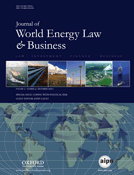
Journal of World Energy Law & Business
Scope & Guideline
Advancing Dialogue on Global Energy Challenges
Introduction
Aims and Scopes
- Legal Frameworks in Energy Regulation:
The journal explores the legal structures that underpin energy regulation across various jurisdictions, including international treaties, national laws, and regional agreements. - Sustainable Energy Practices:
A core focus is on sustainable energy development, emphasizing legal and policy frameworks that facilitate the transition to renewable energy sources and the implications for traditional fossil fuel industries. - Market Dynamics and Economic Analysis:
The journal investigates the economic aspects of energy markets, including price volatility, investment strategies, and the impact of global events on energy supply and demand. - Energy Justice and Policy Analysis:
Research often addresses the principles of energy justice, examining how legal frameworks can promote equitable access to energy resources and the implications for marginalized communities. - Technological Innovations and Legal Challenges:
The journal also covers the legal implications of emerging technologies in the energy sector, such as blockchain, AI, and carbon capture, and their potential to reshape energy markets.
Trending and Emerging
- Energy Transition and Climate Change:
A significant trend is the increasing focus on legal frameworks that facilitate energy transitions towards renewable resources and the implications of climate change policies on energy production. - Regulatory Responses to Energy Crises:
The journal has seen a rise in articles analyzing regulatory responses to recent energy crises, particularly the impacts of geopolitical events on energy security and market stability. - Decarbonization and Carbon Markets:
Emerging discussions around decarbonization strategies and the establishment of carbon markets indicate a growing interest in how legal mechanisms can support the transition to a low-carbon economy. - Technological Innovation in Energy Law:
Research focusing on the legal implications of technological advancements, such as digitalization and smart contracts in energy transactions, is increasingly prominent, reflecting the industry's evolution. - Energy Justice and Equity:
There is a growing emphasis on energy justice and equity, with research exploring how legal frameworks can address inequalities in energy access and promote just transition policies.
Declining or Waning
- Traditional Fossil Fuel Regulation:
There has been a noticeable decrease in papers focusing exclusively on the regulation of traditional fossil fuels, indicating a shift towards discussions on renewable energy and sustainability. - International Investment Arbitration:
The frequency of articles discussing international investment arbitration in the context of energy has diminished, suggesting that this topic may be perceived as less critical compared to emerging legal challenges in the energy transition. - Conventional Energy Market Analysis:
Papers analyzing conventional energy market dynamics, particularly in the context of established oil and gas markets, have seen a reduction, as attention turns to the impacts of renewable energy and market transitions. - Legal Challenges in Nuclear Energy:
Research specifically addressing the legal challenges surrounding nuclear energy appears to be less prevalent, possibly due to a broader focus on renewable energy sources and climate change issues.
Similar Journals

Journal of Energy Markets
Exploring the Dynamics of Energy EconomicsJournal of Energy Markets, published by Incisive Media, is a vital platform dedicated to advancing the understanding of energy market dynamics, with an ISSN of 1756-3607 and an E-ISSN of 1756-3615. Established in the United Kingdom, the journal explores the intersection of economics, energy, and strategic management, serving as a key resource for researchers, professionals, and students alike. While the journal is currently categorized in the Q4 quartile across relevant fields such as Economics and Econometrics, it aims to stimulate scholarly dialogue, enhance empirical research, and present innovative methodologies in the rapidly evolving energy sector. Despite its nascent impact factor in 2023, the Journal of Energy Markets remains committed to publishing high-quality articles that address critical issues and trends affecting the global energy landscape. The journal is essential for those looking to deepen their knowledge and contribute to ongoing debates within this important field.

Frontiers in Energy
Connecting Researchers to Drive the Energy Revolution.Frontiers in Energy is a distinguished journal published by HIGHER EDUCATION PRESS, focusing on the dynamic and rapidly evolving field of energy engineering and power technology. Established in 2011, the journal serves as a pivotal platform for disseminating innovative research findings and practical applications that address critical challenges in energy systems. With an impressive Q2 ranking in 2023 and a Scopus rank of 81 out of 272 in the discipline, it highlights the journal's influential impact within the academic community, reflecting its commitment to high-quality research. Based in Beijing, China, the journal aims to promote open and accessible scientific discussion, facilitating collaboration among researchers, professionals, and students alike. As an open access publication, Frontiers in Energy ensures that valuable knowledge is readily available to a global audience, effectively contributing to advancements in sustainable energy solutions. Join the forefront of energy innovation by engaging with cutting-edge research that shapes our energy future.

INTERNATIONAL JOURNAL OF ENERGY RESEARCH
Advancing sustainable solutions for a brighter energy future.INTERNATIONAL JOURNAL OF ENERGY RESEARCH (ISSN: 0363-907X; E-ISSN: 1099-114X), published by Wiley-Hindawi, stands at the forefront of energy research, offering a scholarly platform pivotal for advancing knowledge in the fields of energy engineering, nuclear energy, fuel technology, and renewable energy systems. With an impressive Q1 and Q2 ranking across several categories as of 2023, this journal reflects a commitment to high-quality, peer-reviewed research that addresses both theoretical and practical challenges in the energy sector. Now an Open Access journal since 2023, it enhances accessibility and dissemination of cutting-edge research to a global audience. Located in the United Kingdom, with an active publication history dating back to 1977, the journal aims to contribute to sustainable energy solutions and innovative technologies. Researchers, professionals, and scholars will find valuable insights and discussions here, bridging gaps in energy research and policy-making.

Economics of Energy & Environmental Policy
Connecting Economic Principles with Environmental Impact.Economics of Energy & Environmental Policy is a prestigious journal published by the International Association for Energy Economics, focusing on the intersection of economic principles and energy/environmental policy. Since its inception in 2012, this journal has provided a critical platform for researchers, professionals, and students interested in the multifaceted impacts of energy economics on society and the environment. With an impressive performance reflected in its 2023 Scopus rankings—Q2 in key areas such as Economics and Econometrics, Energy, and Management, Monitoring, Policy and Law—this journal not only contributes to academic discourse but also informs policymaking and industry practices. Although published as a traditional journal, its contents are vital for addressing contemporary challenges in energy management and environmental sustainability. Located in Cleveland, Ohio, the journal is committed to fostering innovation in energy economics, enhancing our understanding of the socio-economic dimensions of energy use, and promoting effective environmental policymaking.
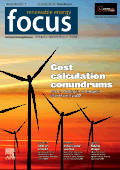
Renewable Energy Focus
Championing Research for a Cleaner, Greener PlanetRenewable Energy Focus is a premier journal published by Elsevier, dedicated to advancing the field of renewable energy and sustainability. With an ISSN of 1755-0084 and an E-ISSN of 1878-0229, this journal serves as a vital platform for researchers, professionals, and students interested in innovative solutions to energy challenges. Established in 2007, the journal has evolved to become a recognized authority in the subject area, currently ranked in the Q2 quartile of its category for 2023, emphasizing its significance in promoting impactful research. The journal encompasses a wide range of topics, including solar, wind, bioenergy, and sustainable practices that contribute to environmental conservation and energy efficiency. As part of Elsevier's commitment to disseminating high-quality research, Renewable Energy Focus is indexed in Scopus, currently holding a rank of #92/270 in the energy sector, positioning it in the 66th percentile of its field. This journal offers an essential resource for those dedicated to fostering sustainable energy solutions.
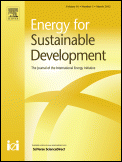
Energy for Sustainable Development
Illuminating the future of energy in sustainable development.Energy for Sustainable Development, published by Elsevier, is a leading interdisciplinary journal dedicated to advancing the academic discourse at the intersection of energy, sustainability, and development. With an impressive Q1 ranking in the fields of Geography, Planning and Development, and Management, Monitoring, Policy and Law, the journal stands out in the academic community for its rigorous peer-reviewed content that addresses crucial energy challenges and promotes innovative solutions. Since its inception, the journal has transitioned through various converged periods, reflecting on dynamic research trends from 1994 onwards. Notably, it boasts meaningful Scopus rankings, including a position in the top 10% of journals for Geography and Planning. Although it currently does not provide open access, the rich pool of research articles published here serves as a vital resource for researchers, professionals, and students committed to fostering sustainable development practices globally. As energy issues become increasingly pivotal in policy formulation and environmental considerations, Energy for Sustainable Development remains a crucial platform for disseminating impactful knowledge and fostering collaboration across disciplines.
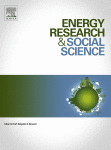
Energy Research & Social Science
Advancing Research for a Sustainable Energy FutureEnergy Research & Social Science is a leading interdisciplinary journal published by ELSEVIER, focusing on the dynamic interaction between energy systems and social dynamics. With an ISSN of 2214-6296 and an E-ISSN of 2214-6326, it has been at the forefront of energy studies since its inception in 2014. The journal is recognized for its high impact, currently holding a Q1 ranking across multiple categories including Energy Engineering and Power Technology, Fuel Technology, and Social Sciences, making it an essential resource for scholars and professionals alike. Its Scopus rankings further reinforce its prominence, with notable placements such as Rank #4 in Nuclear Energy and Engineering and Rank #7 in Social Sciences (miscellaneous). Although not an open-access journal, it offers valuable insights and research findings that span from renewable energy to sustainable practices, empowering readers to engage critically with the challenges and innovations shaping the energy landscape. As the energy sector evolves, Energy Research & Social Science serves as a invaluable platform for disseminating research that bridges scientific inquiry and socio-economic realities, catering to the needs of researchers, professionals, and students dedicated to creating a sustainable energy future.
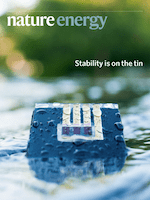
Nature Energy
Advancing sustainable energy solutions for a brighter future.Nature Energy is a leading academic journal focused on the multidisciplinary field of energy research, published by NATURE PORTFOLIO. Since its inception in 2016, the journal has rapidly established itself as a key platform for innovative research on energy technologies, sustainable practices, and advancements in renewable energy sources. With an impressive impact factor and consistently ranked in the Q1 category across various disciplines, including Electronic, Optical and Magnetic Materials, Energy Engineering, and Fuel Technology, Nature Energy attracts a global audience of researchers and professionals committed to addressing the pressing energy challenges of our time. Its Scopus rankings highlight its exceptional standing in the field, with leading positions in Energy Engineering and Renewable Energy categories, underscoring its importance in shaping future energy strategies. For those looking to contribute to the discourse on sustainable energy solutions, Nature Energy offers an engaging avenue for dissemination of cutting-edge research and innovative ideas.
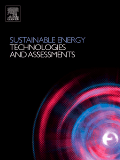
Sustainable Energy Technologies and Assessments
Illuminating Paths to Renewable Energy ExcellenceSustainable Energy Technologies and Assessments is a prestigious journal published by ELSEVIER, based in the United Kingdom, focusing on the critical field of energy engineering and its intersection with sustainability. Since its inception in 2013, the journal has established itself as a leading platform for disseminating innovative research and assessments of sustainable energy technologies, earning a notable Q1 ranking in both Energy Engineering and Power Technology, as well as Renewable Energy, Sustainability, and the Environment. With an impressive Scopus ranking—#22 out of 272 in Energy Engineering and #40 out of 270 in Renewable Energy—this journal is essential for researchers and professionals seeking to advance their knowledge on cutting-edge developments and assessments in sustainable energy. Although the journal operates on a subscription basis, it remains committed to promoting high-quality research that aligns with global sustainability objectives. Researchers and students alike will find invaluable insights and data that shape the future of renewable energy technologies within these pages.
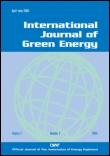
International Journal of Green Energy
Fostering dialogue on the future of renewable energy.The International Journal of Green Energy is a premier publication that plays a pivotal role in the field of renewable energy and sustainability. Published by Taylor & Francis Inc, this journal, with ISSN 1543-5075 and E-ISSN 1543-5083, has established itself as a crucial platform for sharing innovative research and developments from 2005 to 2024. With a commendable Q2 ranking in the category of Renewable Energy, Sustainability and the Environment, it ranks 100 out of 270 in Scopus, positioning itself in the 63rd percentile of its field. The journal is dedicated to advancing knowledge and fostering dialogue around green technologies and sustainable practices, providing invaluable insights for researchers, industry professionals, and students alike. Although it does not offer open access options, the journal's commitment to rigorous peer review ensures that only high-quality research is published, making it an essential resource for those seeking to explore and understand the complexities of green energy solutions.